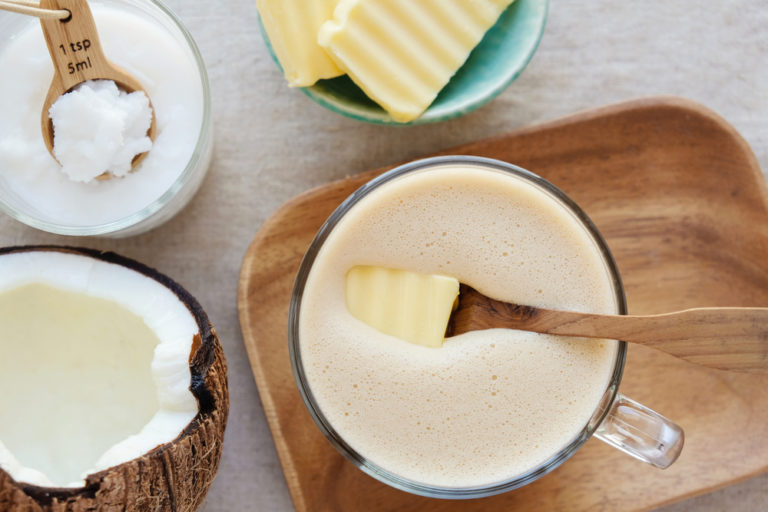Medium-chain triglycerides (MCT) oil has received a good amount of attention over the years, but what exactly is it? Can you eat it, should you cook with it, or add it to your coffee? Where does MCT oil come from?
What Is MCT Oil?
MCT oil is a form of saturated fatty acid that is found naturally in coconut oil and palm oil. MCT oil can be divided into four groups based on carbon length, ranging from six to twelve carbons. The “medium” portion of MCT refers to the-chain length of the fatty acids. Roughly 62 to 65 percent of the fatty acids found in coconut oil are MCTs.
Oils, in general, contain short-chain, medium-chain, or long-chain fatty acids. The medium-chain fatty acids found in MCT oils are
- Caproic acid (C6)
- Caprylic acid (C8)
- Capric acid (C10)
- Lauric acid (C12)
The predominant MCT oil found in coconut oil is lauric acid. Coconut oil is roughly 50 percent lauric acid and is known for its antimicrobial benefits throughout the body. (1) While coconut oil is one of the most popular ways to consume MCT oil, you can also find MCTs in other foods such as
- Grass-fed butter
- Palm oil
- Full-fat dairy
- Goat’s milk
True coconut oil contains all four MCTs as well as some longer-chain fatty acids, while MCT oil is not an oil found in nature, but rather manufactured to separate out the medium-chain fatty acids from the rest of the oils. These fatty acids are extracted out through a process known as fractionation. You can purchase pure MCT oil that is concentrated caprylic and capric acid.
MCT oils are digested differently than other fats since they are sent right to the liver, where they can act as a quick source of fuel and energy at a cellular level. MCT oils provide different proportions of medium-chain fatty acids compared to coconut oil. (2)
6 MCT Oil Health Benefits
MCT oil is widely used in health circles for a number of reasons, but here are the six most popular, research-backed reasons to include this healthy liquid fat in your diet.
1. Weight Loss
MCT oils can have a positive effect on weight loss and fat reduction since they can raise metabolic rate and increase satiety. A 2003 study found that after consuming MCT oil, rather than LCT oil, the body composition and fat oxidation in obese women was improved. Due to their heating effect in the body and their ability to be rapidly used for energy, MCT oils have been found to suppress fat deposits through their ability to enhance thermogenesis and fat oxidation in animals and humans. (3, 4)
2. Energy
MCT oils provide about 10 percent fewer calories than longer-chain fatty acids, which allows the MCT oils to be more rapidly absorbed in the body and quickly metabolized as fuel. Instead of being stored as fat, the calories found in MCT oil are efficiently converted into fuel for immediate use by organs and muscles in the body.
MCTs can cross the double mitochondrial membrane rapidly, and do not require the presence of carnitine, which results in an excess of acetyl-coA. This is important for various metabolic pathways such as the Krebs cycle and production of ketones. (5)
3. Blood Sugar Support
MCTs can raise ketones and lower blood sugar levels naturally, as well as stabilize blood glucose levels and decrease inflammation. MCTs can reduce the output of glucose by the liver while also inhibiting the production of fatty acids in adipose tissue.
MCT oil provides a non-carbohydrate fuel source to the body and brain due to its ability to be quickly absorbed and metabolized. In fact, MCTs can readily cross the blood-brain barrier and be oxidized by the brain, providing a direct and indirect brain fuel source via the generation of ketones and offering diabetic patients a treatment strategy to preserve brain function in times of hypoglycemia without raising blood glucose levels. (6)
4. Appetite Control
Research has found that MCT oil can suppress appetite in those who struggle with cravings and overeating. A 14-day study of six males found that those men who had diets higher in MCT oils consumed less overall calories. (7) Consumption of MCT oil as a part of a weight loss plan can be useful in long-term weight management. Human studies have found that MCT oils can increase fat oxidation and thermogenesis compared to LCT, and have been shown to improve overall fat mass loss. (8)
5. Brain Health
Medium-chain fatty acids are unique in their ability to be absorbed and metabolized by the liver, allowing them to further be converted into ketones. Ketone bodies are an important alternative energy source in the brain, and have been found to be beneficial to those individuals with cognitive impairment, as in Alzheimer’s disease. MCTs from coconut oil may assist in preventing the development of amyloid plaque, a key step in the pathogenesis of Alzheimer’s disease. (9)
6. Gut Health
MCT oil consumption can be beneficial for balancing gut bacteria in the microbiome, as well as support digestion and nutrient absorption. MCT oils act as natural antibiotics through their antibacterial and antimicrobial properties thanks to lauric acid, which can reduce pathogenic bacteria. MCT oils were found to provide better protection from infections when compared to longer-chain fatty acids. (10) MCT oils also have shown positive effects on liver and gut health through their ability to reduce inflammation and support the immune response. (11)
4 Ways to Use MCT Oil
Looking for a creative way to get more of these marvelous MCTs into your diet? Try these:
1. Add It to Your Coffee or Tea
Start with a teaspoon and work your way up, but simply adding a quick squeeze of MCT oil to your favorite coffee is one of the most popular (and easiest) ways to get more healthy fats into your diet. Add some cinnamon or flavored stevia to your mixture and blend it up for a frothy and fabulous treat.
2. Mayonnaise
If you are looking to upgrade your chicken or tuna salad, then use a tablespoon of MCT oil, one whole egg yolk, a little extra virgin olive or avocado oil, some lime juice, and sea salt to make your very own MCT mayonnaise. Blend all of the ingredients together and mix it into your favorite dish for a creamy texture!
3. Smoothie Boost
Start your morning off right with a nutrient-dense smoothie. Pack your blender with as much Paleo goodness as you can get in there, like a tablespoon of MCT oil, handful of spinach, coconut or almond milk, half a frozen banana, and your favorite protein powder!
4. Frozen Delights
If you are looking for a way to satisfy your sweet tooth without wreaking havoc on your glucose levels, then give this quick and easy MCT recipe a try!
- Combine ½ cup of MCT oil with ¼ cup nuts of choice (pecans are a great option) and a packet of stevia or 1 teaspoon of raw honey.
- Line a pan with parchment paper and pour the mixture in. Freeze for 30 minutes.
- Remove and break apart into pieces. Drizzle some dark chocolate on top for a not-so-guilty indulgence.
 Brianna Diorio is a clinical nutritionist with an MS in human nutrition. She is also a holistic lifestyle coach and NASM CPT. Diorio advocates a holistic and naturopathic approach toward health and wellness, placing importance on proper digestive health, gluten-free living, herbal supplementation and using food as functional medicine as information for our cells. She is the director of training and education at Vitamer Laboratories in Irvine, CA.
Brianna Diorio is a clinical nutritionist with an MS in human nutrition. She is also a holistic lifestyle coach and NASM CPT. Diorio advocates a holistic and naturopathic approach toward health and wellness, placing importance on proper digestive health, gluten-free living, herbal supplementation and using food as functional medicine as information for our cells. She is the director of training and education at Vitamer Laboratories in Irvine, CA.








